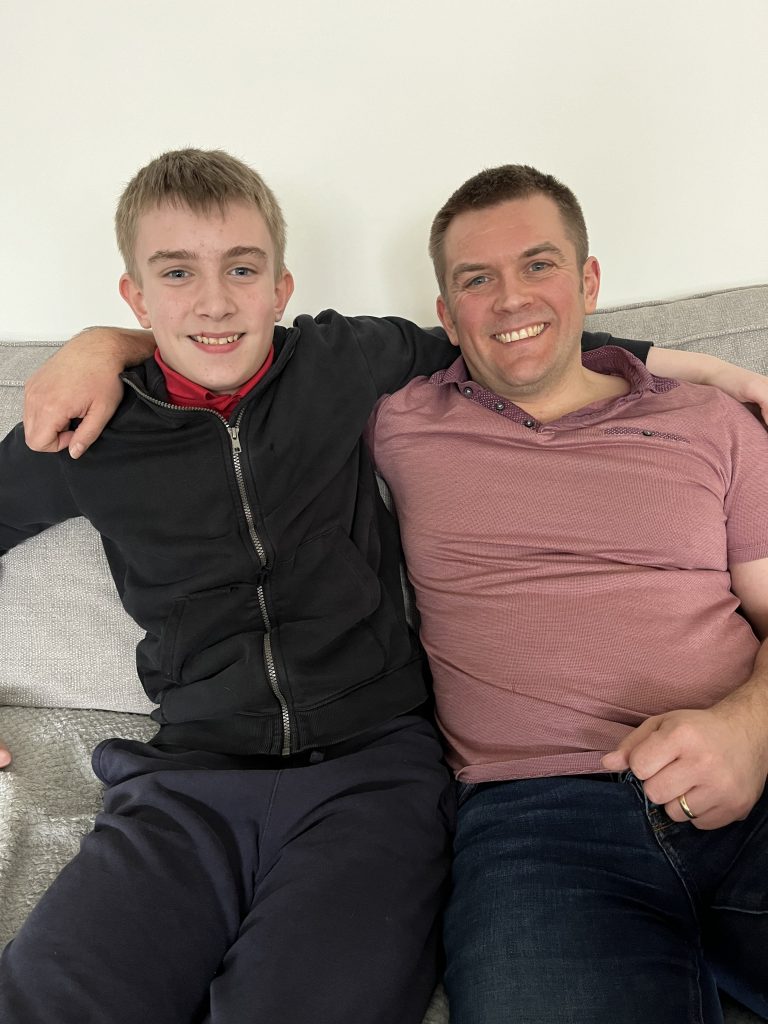Neurodiversity Celebration Week is a worldwide initiative that challenges stereotypes and misconceptions about neurological differences.
It aims to transform how neurodivergent individuals are perceived and supported by providing schools, universities, and organisations with the opportunity to recognise the many talents and advantages of being neurodivergent, while creating more inclusive and equitable cultures that celebrate differences and empower every individual.
This week, as part of our celebrations, we have been speaking to Regional Service Delivery Manager, Mike Killingbeck, and he has kindly shared some of his experiences. Read his story below.

So, Mike, tell us a little bit about yourself?
I’ve worked for Severn Trent Services for around 15 years now in a number of roles, with me being in my currently position of Regional Service Delivery Manager for around 9 years now. I live in Southport with my wife, Lizzie, and our two children, Daniel (11) & Madelyn (6).
Why do you think Neurodiversity Celebration Week important?
I think that many of us may be living with undiagnosed or misunderstood conditions and even though many of us will remain undiagnosed through either choice or other factors, just having access to a greater level of knowledge, understanding & tolerance can help us all to have a better experience.
Tell us a little more about your journey with autism.
Our journey with autism began very early into Daniel’s young life. Nothing major, just a few milestones in development that were being missed: toilet training, speech development, hand eye coordination, self-led play. Nothing that you would say was alarming, but which together built up into a bigger question. That said, some things he did excel at, for instance he could stand unaided at just over 6 months and was walking at 10, so maybe being slower to develop in some areas allowed him to excel in others?
Given the early detection of the “red flags,” we were given the option to pursue a clinical diagnosis which involves the accumulation of a lot of different test parameters over a period, such as speech and language, hand-eye coordination, and social awareness. It took about 2 years to “amass” this data, at which point you are told that there is enough available to allow a panel diagnosis of the condition if we wanted it.
If we want it. This is an important question and goes back to the aura of autism point I posed at the start; autism has in the past carried a certain stigma. As a result, parents are asked for permission to diagnose in case they are concerned about the that stigma. We were both very keen for the panel diagnosis, went ahead with it and Daniel received an official clinical diagnosis: Autistic Spectrum Disorder (ASD).
What were the benefits of the early diagnosis for you and your family?
Before I talk about our life, I’d like to highlight the benefits of the diagnosis.
Firstly, there is no stigma attached to autism. It is something that is far more mainstream now than it ever was. Also, the support that is available for children & adults with autism is incredible. As a result of his diagnosis, Daniel qualifies for financial help which goes towards things such as extra tutoring and he also gets great access to educational support & funding in school. As a result of the early diagnosis, this means that his extra learning needs are catered for all the way through his time in primary and secondary education.
Knowing that he gets this support without too much of a battle is a massive relief. Without his diagnosis he would not qualify for this, so I would urge anybody in the same situation to pursue that diagnosis.
What’s it like to live with an autistic family member?
I must be honest, I have no idea because I really don’t have a good point of reference to what it is like not to live with an autistic family member. Daniel was diagnosed with ASD at the age of 4. He had a very early diagnosis, something that I must credit my wife with for her perseverance with his nursery school and the NHS paediatric services. I’m not sure I would have known where to begin.
It’s hard to say because I can only describe our family life as normal. Daniel is a normal boy with the same interests and desire to be popular as his friends. He’s obsessed with his PS4 and wants to take part in most of the same activities as his mates. He’s got the same obsession with Prime hydration drink as all his friends (even though I’m convinced none of them like the taste of it!) and talks about the same crazes of the day as I did when I was his age.
So, what else can you tell us about ASD?
Well, there are some things that we are aware of which could be described as part of his ASD, but then again, perhaps not. For example, he is obsessed with fragrances and scented candles. He’s got an aftershave collection a lot bigger and a lot fancier than mine. This is known as hyper sensory stimuli, a known symptom of ASD. He’s utterly obsessed with trains and would happily spend every free hour riding up and down the local lines with his long-suffering grandparents. He can be very strong willed about certain things up until the point where it’s been proven or disproven categorically, at which point he’ll switch his view irreversibly.
We have never seen him play with a toy during his childhood. He doesn’t seem to know what they are for.
He will do some of the classic ASD related things such as “stimming” when he’s over excited (erratic movements of his hands and feet) to help him discharge his unspent energy. He also has a terrible fear of dogs which can overwhelm him. He can get himself over excited and can sometimes get into “meltdown”, however as he gets older this happens less and less.
He and I will do the normal father and son banter and teasing just as you’d expect. I normally get the worst of it. He plays well and cares for his younger sister, Madelyn, when they aren’t bickering, and she adores him.
He’s also an extremely caring, polite, and loving boy, whilst at the same time he can sometime struggle to understand why saying certain things could be rude or inappropriate.
Is there any advice, or support you want to share with others in your situation?
Daniel is due to start high school this year and we worry how he will cope. My concerns are around bullying. He’s very trusting of others and I’m worried he might be vulnerable to being exploited because of his friendly nature. That said, I think all parents harbour the same worries, and we will be there to help and support him along the way however and whenever we can.
One thing that it’s worth noting is that Daniel is aware of his diagnosis, as are his friends. We told him when he was about 7, and he’s dealt with it in his stride, learning to both embrace and control his ASD when he feels the needs to. His friends are hugely supportive.
At the age of 11, I simply wouldn’t change a thing about him, he is his own person and character who will light up the room and be somebody to inspire others.
Yes, I worry about the future, however the older he gets, the more he surprises me and his mum and proves that there are no barriers which love, support and understanding cannot overcome.
Thanks for sharing yours, and your family’s story with us, Mike.

Want to learn more about Neurodiversity? You can sign up to one of the many neurodiversity related webinars here, covering topics such as Neurodiversity & Language, Neurodiversity & LGBTQIA+, Neurodiversity at Work, and much more!








